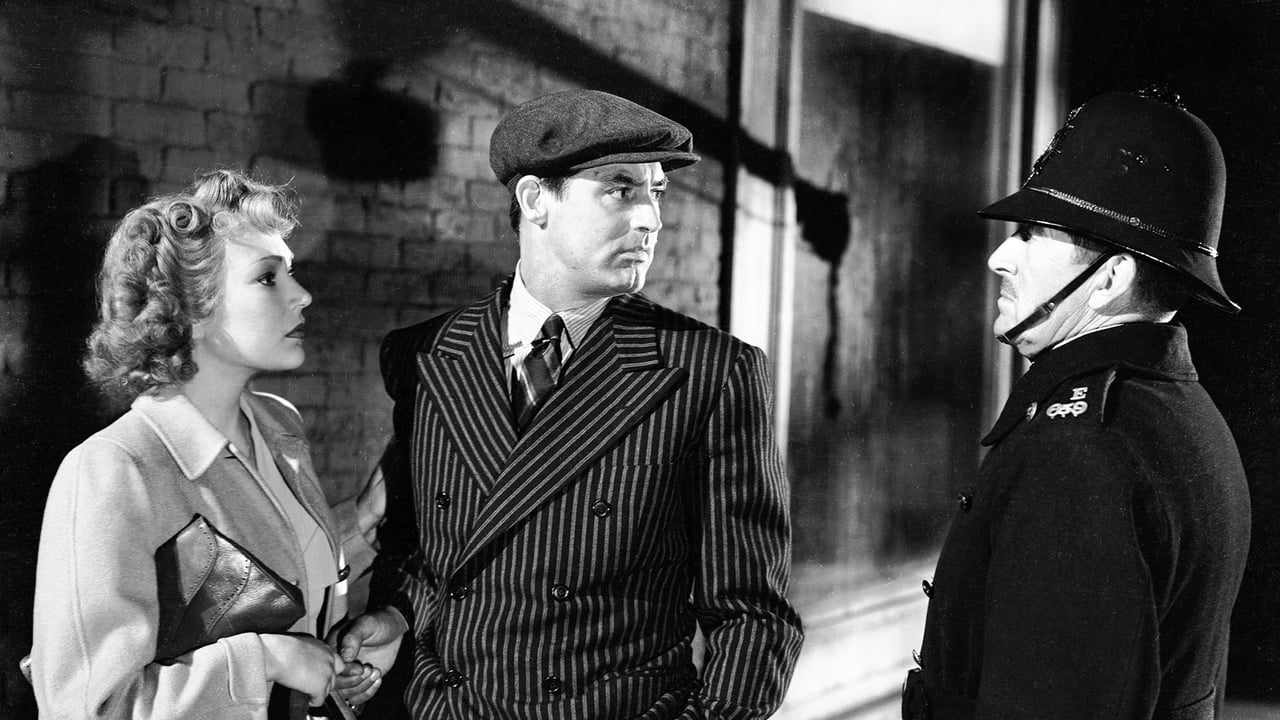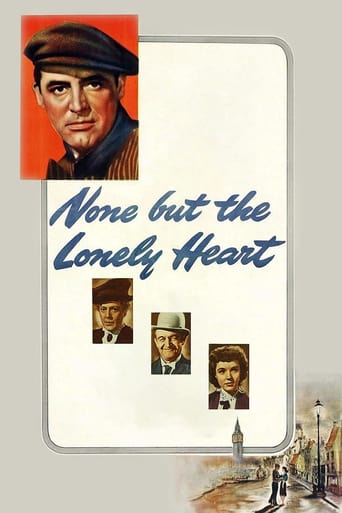

Ernie Mott (Cary Grant) is an irresponsible vagrant roaming the streets of London. His father had died in the Great War. His mother (Ethel Barrymore) runs a small shop by herself. He plays the piano, fools around with a gangster's ex Ada Brantline (June Duprez), and has a friendship with nice neighborhood girl Aggie Hunter (Jane Wyatt). After learning about her mother's cancer, he stays to run the shop despite their combative past.Ernie is not really an appealing character and that's tough to do for Cary Grant. I'm also annoyed by his relationship with Ada. I want more time with Aggie and have more love triangle action. The character would be appealing as an exuberant youth struggling to find his way in the world. Cary Grant was 40 by then. I can see this as a lower class melodrama like a Mike Leigh movie but Cary Grant doesn't really fit the role. It's interesting nevertheless.
... View MoreJane Wyatt's portrayal of Addie Hunter, as the tolerant yet, adoring neighbor and admirer of protagonist Ernie Mott; played by Cary Grant in 'None but the lonely Heart. Is, in my opinion, one of the best early on screen examples of why she is so endearingly remembered as the wife of Jim Anderson played by Robert Young, Mrs. Margaret Anderson, in the 1960's T.V sitcom, 'Father Knows Best'.Addie Hunter was an idiosyncratic, enigmatic personality. She was a woman who may appeared seem to most, a hopeless romantic 'stuck' on the likes of a cad like Ernie Mott. But, in the reality of the part played, she's a very emotionally mature and intelligent independent minded woman. One that understood exactly who she was and what she wanted.Addie was not a fool, she clearly understood Mott was an inaccessible cad, and no account who obviously, was obliviously unaware of what he wanted and also, intimidated by Addie's ability to unabashedly know, what she did, and unafraid to acknowledge it. I could not help but admire her insightful sense of self-understanding not only of herself, yet Grant's superb portrayal of Mott's personal short comings. Because, in doing so she too, Addie, was just as inaccessible to Mott, and the perfect foil in contrast to Grant's character.In all of their scenes together, it is Addie who is in charge, even if or when Grant character Mott, tried to make her feel she was not. Whether it was when they both walked as far as the fish and chips shop together and he's stuck by her understanding of him as a man, tells him she knew perfectly well, how to handle him, not at all. The scene in the hallway of her flat, where he's talking about Ma Mott's illness and Addie senses he feels a need to come clean, and let her down easy; even though she knows full well already he's been seeing another woman; or, the one where he plays the piano in her flat and calls her a fool.In each, he always left dumb struck by her nuanced admiration of him and controlled emotional and intelligent behavior. Check it out and see for yourself. Jane Wyatt, was meant to eventually to be the perfect match for Robert Young as Mrs. Margaret Anderson , in the T.V sitcom 'Father Knows Best'.
... View MoreThe story behind this one when it was made was the return of Ethel Barrymore to the movie screen after a long time doing live stage productions. Interesting in that she is one of the few in this with very little British accent, yet because of her acting skills and return nobody cared. In fact RKO was already on major cramped budgets when this film was made. Like Barrymore, it had been a long time since King Kong and Gunga Din.Neither story made out too well, as this one did little business in the theaters. It seems in 1944, with the war raging in both oceans, this one just was not really in demand. The story is okay though a serious Cary Grant did not seem to be ready for prime time. Grant tries to carry part of the film, and Barrymore as his mother tries to carry the other. The cockney accent of the support cast is difficult to understand which made the film less audience friendly. Some of the writing on this is from the same writers that worked on How Green Was My Valley but this one is not even a shadow of that one, though the accents in that movie are thick too. Guess that proves that sometimes a weakness in one movie is not the same thing in another one.Grant is the careless son who mom is trying to make responsible this entire movie. He has many girl friends trying to move him in the same direction. It is only his mom who has any success though.
... View MoreMost commentators have focused on the great affinity that Cary Grant had for Ernie Mott, and the great under-appreciated performances he delivered in this and other similar roles. I completely agree. I regret that so many great actors such as Grant and Errol Flynn were typecast. I wish they had been able to leave us a broader cinematic legacy, and I wish that TCM exposed us to the breadth of their rich legacies more regularly.None But the Lonely Heart is full of characters brought to life by familiar actors delivering absolutely spot-on performances. That is one of the film's great strengths.The recreation of London's back streets on RKO's back lots and sound stages is also remarkably convincing. This is one of the components of what was termed "Movie Magic" before first, location shooting, then high-tech special effects, and finally, digitalization co-opted the term. This "art" of convincingly capturing the essence of a location within the confines of a studio is one of the quaint aspects of old films that, when done well, fascinates me. It is the essence of Imagination - both of the filmmaker and the audience. This film is "Movie Magic" at its best.It is also a film of far greater depth than has been reflected in any of the comments. The symbolic bookends of this film are the 2 great world wars. It begins on the eve of Armistice Day (commemorating WWI) where Ernie Mott (everyman) meets Mr. Twite at the Tomb of the Unknown Warrior. Mott acknowledges that the unknown dead man might have been his father and Twite says he might have been his son. The two thus establish a bond that endures for the film and beyond. Mott's symbolic use of the term, "dad" to address the men in the film is also introduced, while Twite begins to refer to Mott as "son." Later we see Mott refer to everywoman (that is, every elder woman) as "mom," except in the latter part of the film he refers to his own mother as his "daughter," when he learns of her illness and he assumes the role of her caretaker. His old, habitual girlfriend (Jane Wyman) will accept him under her roof under any terms. But the new girl he meets, with a "kiddie" (who is never provided a name) wants security. She eventually forsakes him for her autocratic ex-husband, Mott's mobster boss, who ordered the beating of Ma Mott's Jewish friend, Ike Weber, and the ransacking of his business. Near the end of the film, both Mott and his Ma have been arrested for forsaking their honest ways and going after a quick, dishonest gain. Mott, bailed out of jail by Mr. Weber, has visited his dying Ma in jail probably for the last time. At film's end, on the eve of WWII, Mott and Twite gaze skyward and puzzle over the frightful noises they have been hearing overhead. Mott ends up on the stoop of his old girlfriend's flat. Will she let him in? Is he there for good? Has he learned his lesson?This is a film about Idealism, Fascism, Materialism, the inevitability of War (?), the generational role reversal, the Brotherhood of Man, the Hegelian Dialectic . . . Hemingway wrote about a lost generation. Watch this film and see if you don't think there was also a lost British generation between the wars. Mott had been a disillusioned "ex-pat" up north who returned home to London.
... View More